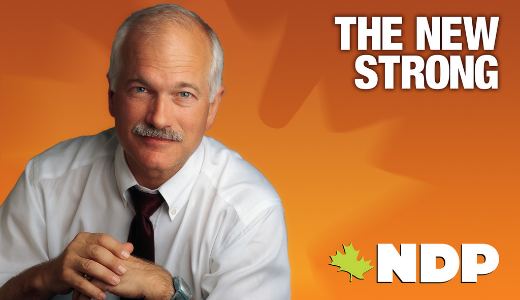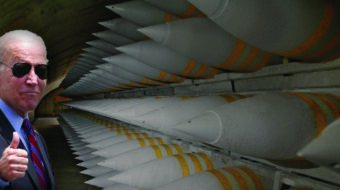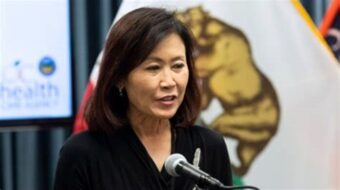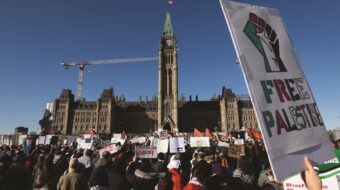
TORONTO – Canada’s history-making federal election on May 2 shifted the political dynamics of the country and set a new stage of struggle for progressives. In the most disappointing news, Prime Minister Stephen Harper’s Conservatives were returned to government for a third time with just under 40 percent of the vote, though this time Harper was finally able to secure a majority of seats in the House of Commons.
For Canadian progressives and the labor movement though, the night was not all bad news. The left-of-center New Democratic Party soared to historic levels of support on a platform of protecting public healthcare, strengthening pensions and making education more affordable. Holding 36 seats at the time the campaign started, the New Democrats vaulted to 108 seats (out of 308). This surge, called the “orange wave” in the media, brought the NDP its best results in its 50-year history and made party head Jack Layton the Leader of the Official Opposition in the new parliament. The Green Party also made history by electing its first MP.
The centrist Liberal Party had long been called the country’s “natural governing party” due to its electoral dominance, but its vote collapsed near the end of the campaign and sent only 34 members back to Ottawa. The Liberals struggled to clarify their message as right-wing party leader Michael Ignatieff unconvincingly promoted a left-wing platform that shared much in common with the NDP. In the end, Ignatieff was unconvincing to voters as an alternative to Harper and could not even manage to hold onto his own seat. He resigned as head of the party the morning following the election.
Much of the NDP’s success came in Quebec, where the anti-Harper vote solidified around it in the closing weeks of the campaign. The separatist Bloc Quebecois party had held a lock on Quebec for two decades, but lost almost all of its seats to the NDP.
Progressive organizations and the labor movement are already gearing up for battles outside of parliament against Harper’s agenda. Criticized for his undemocratic and authoritarian style, many are concerned about how Harper will wield his new majority. He is expected to weaken gun control laws and overturn the system for publicly financing political parties. Fears have also risen about federal program cuts and the safety of the public healthcare system.
While the historic rise of the New Democrats was celebrated by the party, the gains were bittersweet, since Harper was able to garner his majority largely due to vote-splitting between the NDP and the Liberals. The combined anti-Harper vote was more than 60% nationally and Harper’s share actually declined in most areas of the country. But because of Canada’s first-past-the-post electoral system, three- four- or even five-way races in districts often allowed the Conservatives to come up the middle and win with a minority of votes.
Harper ironically gained most of his new seats in and around Toronto, districts traditionally held by the Liberals or the NDP. This result will certainly give new life to debates about closer cooperation between the center and left parties and has already boosted talk among some about a full merger between the Liberals and New Democrats.
The Liberals though, as Ignatieff rightly pointed out, are not a left-wing party and many of their policies have a lot in common with the Conservatives. And with the NDP riding higher than ever before, the old dream of squeezing out the Liberals and becoming the left alternative to the Conservatives has again been reborn. But eventually, arithmetic may force a rethinking by the two parties if neither is ever able to envision a situation where they can individually gain enough votes to take government.
Whatever electoral arrangement is eventually worked out, progressives and the people’s movements will have a tough four years under Harper, until the next election in 2015.
Image: Jack Layton election poster. Sid Williams // CC BY-NC 2.0












Comments